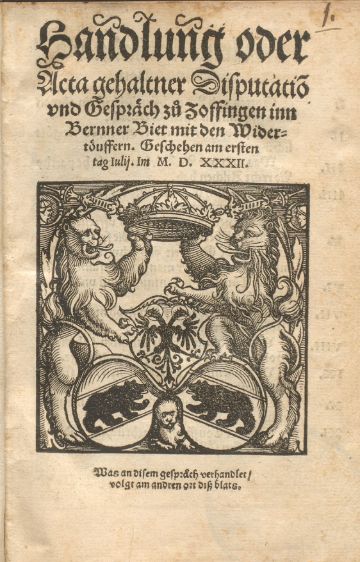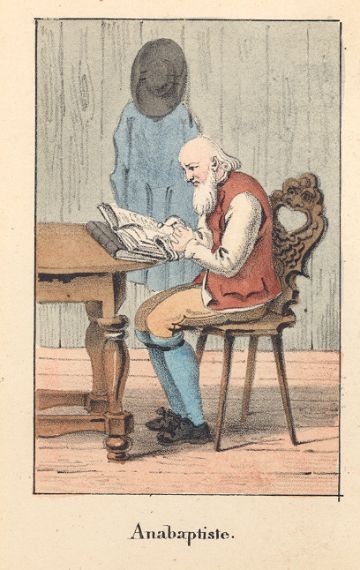Hans Hotz
Hans Hotz is one of the first Anabaptists from 1525, together with Konrad Grebel, Felix Mantz and Georg Blaurock. He, too, is imprisoned several times. But unlike many founding figures, he survives the first wave of persecution. Soon he becomes a key Anabaptist figure throughout Switzerland - including in the Bern region.

Handlung oder Acta gehaltner Disputation und Gespräch zuo Zoffingen inn Bernner Biet mit den Widertöuffern : geschehen am ersten Tag Iulij im M.D.XXXII. ... Getruckt zuo Zürich : by Christoffel Froschouer, anno 1532 (Zentralbibliothek Zürich, Gal Tz 1154).
Hans Hotz plays an important role as a spokesman at the two public disputations with the Anabaptists called by the Bernese authorities in 1532 in Zofingen and 1538 in Bern. He was promised safe conduct, but after the disputation he was immediately taken out of the country with the warning that if he returned to Bern he would be "judged with the sword, without any grace" because he had "seduced my lord's people". After that, Hotz goes underground. Nothing is known about his further fate.

Anabaptiste. Colored lithograph nach Gabriel M. Lory. Kollektion Maeder/Studer, Biel.
After 1538, Bern refrains from public disputations with the Anabaptists, but intensifies the repression.
Audio:
A Zurich Anabaptist Teacher in the Bernese Region
My name is Hans Hotz. As my dialect reveals, I am not from Emmental. I have never been locked up in Trachselwald Castle. But I have been in many other prisons all over Switzerland. But I know Bernese Anabaptism well.
I became an Anabaptist at a very early age. Growing up in the Zurich Oberland, I quickly became enthusiastic about Ulrich Zwingli's sermons. Like many others, I suffered from the grievances in church and society. I had great hopes for the awakening in Zurich led by Zwingli..
was enthralled by the way he interpreted the Bible and let it speak to us in the midst of our everyday lives. His message of God's love, which became visible in Jesus Christ and applies to all, especially to the simple and poor people, moved me deeply and inspired me. I was also convinced that faith in this liberating message could move mountains. And Zwingli's motto - "Where there is faith, there is freedom! - became my principle as well.[1]
But the longer the Reformation lasted, the more disillusioned some of us were.[2]
There was a lot of true preaching about justice and righteousness, about repentance, conversion and a Christian life. But some of Zwingli's circle of friends found it unsatisfying that all this was not put into practice in a concrete and practical way. So did I. That's why we waited for a year or two. [...] But still the teaching was often not put into practice. There was no beginning made with a concrete new life in God, and that because many did not seriously want that. Some were primarily concerned with maintaining power and influence. And although some abuses around the mass and the veneration of saints were effectively abolished, all evil life, all boasting, eating and drinking, all grudges, all envy and hatred continued. Should the whole awakening have been in vain?
We couldn't, we didn't want to believe it. That is why we continued to meet. As we had learned from Zwingli, we deliberated in the circle of friends on the basis of the Bible about the question of how else we should live and believe. "However, after we ourselves have also taken the Bible to hand and examined it for all possible points, we have been taught otherwise!"[3]
The longer the more we were convinced that faith and church membership cannot be forced, but must be voluntary. And that we ourselves should primarily follow our own conscience in life and faith, and not the orders of the authorities. Even if we have to pay a high price for it. What I liked most of all in our circle: I noticed that they were people who were not just making empty words, but who were serious. They were people who were willing to take a self-critical look at their entire lives up to that point, to allow themselves to repent, and to reshape their future lives in a way that they believe is in keeping with Christ's teachings.
On this basis we started a church together - and I was happy to be part of it, because I saw that according to the Bible a true Christian church has to be like this...
Very soon, however, we had to realize that Zwingli and the Zurich authorities were very happy to claim the motto "Where there is faith, there is freedom! " when opposing the traditional Catholics. Alternative renewal movements like Anabaptism, however, were not allowed any freedom for their somewhat different form of Christian faith!
But despite all persecution, we have seen that many people up and down the country have reacted very positively to our message. This has encouraged us to also publicly advocate that our convictions are not criminalized, but taken seriously and at least allowed to have a stand!
Afterword: Hans Hotz was one of the most important spokesmen at the two public disputations with the Anabaptists convened by the Bernese authorities in Zofingen in 1532 and in Bern in 1538. However, Anabaptism was not heard. From then on, Bern refrained from public debates and intensified the repression of the Anabaptists.[4] Hotz received the assurance of a free escort. After the end of the disputation in Bern, however, he was immediately taken out of the country with the warning that if he returned to Bern he would be "judged with the sword, to [without] all grace" because he had "seduced my lords' people".[5]
[1] Zwingli quote from "Auslegen und Gründe der Schlußreden, 14. Juli 1523," in: Huldreich Zwinglis sämtliche Werke, vol. 2 (Leipzig: Heinsius, 1908) (Corpus Reformatorum 89).
[2] The wording of the following passages is taken in part almost verbatim from the statements of Hans Hotz at the Bern disputation of 1538, in Martin Haas (ed.), Quellen zur Geschichte der Täufer in der Schweiz (QGTS), vol. IV: Drei Täufergespräche in Bern und im Aargau, Zurich 1974, 281f.
[3] A modern translation is printed in Heinold Fast (ed.), Der linke Flügel der Reformation. Glaubenszeugnisse der Täufer, Spiritualisten, Schwärmer und Antitrinitarier, Bremen 1962, 13. The original wording was: "Nach dem wir die gschrift ouch zehand genommen habend und von allerley artiklen besechen, sind wir etwaß bericht worden," in Leonhard von Muralt / Walter Schmid (eds.), Quellen zur Geschichte der Täufer in der Schweiz (QGTS), Volume I: Zurich, Zurich 1952, 14.
[4] Die Verhandlungen der beiden Täuferdisputationen von Zofingen und Bern sind abgedruckt in Band IV von Quellen zur Geschichte der Täufer in der Schweiz, Zürich 1974.
[5] Quellen zur Geschichte der Täufer in der Schweiz, Bd. III: Aargau - Bern – Solothurn, Zürich 2008, 384.



